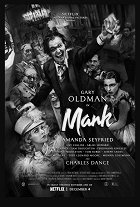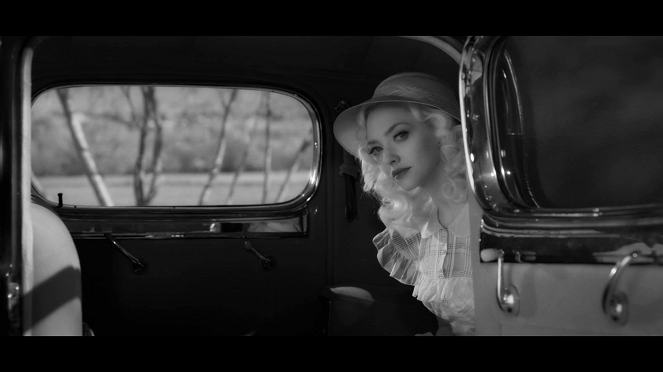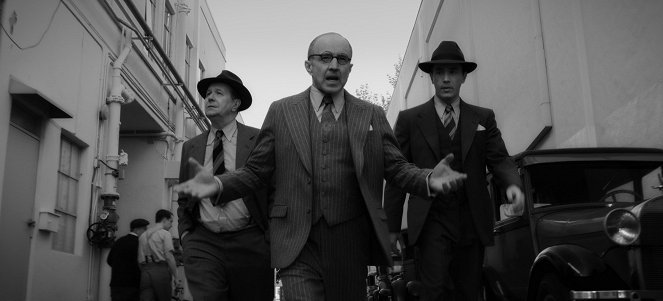Directed by:
David FincherScreenplay:
Jack FincherCinematography:
Erik MesserschmidtCast:
Gary Oldman, Amanda Seyfried, Lily Collins, Charles Dance, Tom Burke, Joseph Cross, Tuppence Middleton, Leven Rambin, Tom Pelphrey, Arliss Howard (more)VOD (1)
Plots(1)
1930s Hollywood is reevaluated through the eyes of scathing wit and alcoholic screenwriter Herman J. Mankiewicz as he races to finish Citizen Kane. (Netflix)
Videos (2)
Reviews (15)
I get that Mank was David Fincher's way of fulfilling a dream for his late father by bringing his screenplay to life—a love letter to a time when Hollywood was at its peak, filled with actors, booze, and the chaos of an industry in full swing. And sure, Mank himself was no stranger to all of that. But honestly, the film felt a little too nostalgic for me. Over the course of two hours, so much happens, but you're given very little explanation, and the black-and-white aesthetic, paired with endless dialogue, made it hard to stay fully engaged. That said, Gary Oldman is incredible, especially in his drunken scenes, which are truly the highlight of his performance. I also really enjoyed Arliss Howard as MGM's Louis B. Mayer—he had limited screen time, but he absolutely made it count. And Charles Dance, as the powerful William Randolph Hearst, barely needed to say anything to command respect. Mank definitely has its shining moments, but overall, it's a dense, dialogue-heavy film that requires a lot of attention. By the end, I was struggling to keep up, but I’ll admit, the finale is a solid payoff.
()
In the first minutes, if not seconds, I was amazed by how Mank looks - truly like it was filmed 80 years ago, a beautifully restored film that made it to Netflix this year (and, sadly, not to movie theatres where it REALLY deserves to be). The best part is that the amazement didn't leave me by the end of the film, and it is also great in terms of the script, the actors (Gary Oldman is even better than you think), actresses (the magical Amanda Seyfried and Lily Collins) and music (untypical but excellent Reznor and Ross). If you don't want to watch Citizen Kane before Mank, then after Mank you will. And then you'll probably watch Mank again.
()
Mank attracts viewers primarily through its unraveling of the tangle of influences that led the title character, an alcoholic screenwriter, to write the celebrated Citizen Kane. However, the actual writing of that screenplay plays second or rather third fiddle in Mank, as there is no depiction of the classic’s shooting, the great Tom Burke as Orson Welles appears on screen for a total of maybe three minutes, and Mank isn’t very faithful to the historical facts; for example, it presents Welles’s involvement in the drafting of the screenplay in accordance with myths that have long since been debunked. In fact, Mank is rather generally focused on the workings of Hollywood in the 1930s and during the Great Depression, and to roughly the same extent it deals with the political mood of the time and the affair involving the 1934 California gubernatorial race, which is understandably not much of a draw for viewers. But that’s not the problem. Rather, the problem is that none of this is rendered in a very engaging way. Though I fully understand Fincher’s desire to make a film based on his father’s long-shelved screenplay, that screenplay is unfortunately about uninterestingly written and poorly defined characters who frequently deliver witty and precisely aimed lines, but what good is that when there is no one to build any kind of relationship with on the screen? Furthermore, the second half of the film fundamentally loses traction and, with the exception of a drunken scene at a fancy-dress dinner party, it doesn’t contain much that’s remarkable. Tim Burton's Ed Wood, for example, was made with a similar intention and turned out much better. Mank is also related to Citizen Kane in its attempt at an audio-visual retro-form, which, though impressive, is not in any way consistent (after all, it was shot in widescreen digital), with a complicated narrative structure full of flashbacks (which are rather oddly skipped between in places) and a lot of different allusions (visual quotes, references to sleds and rosebuds, for example). Therefore, it is definitely necessary to see Citizen Kane before watching Mank. And though it’s fortunately not entirely necessary, it helps to know something about the key figures of Hollywood society at the time.
()
A sea of name dropping, perfectly executed visuals, but emotionally speaking, Mank only barely whispered to me here and there, rather than speaking to me coherently. It is the completion of a homework assignment for me and David Fincher, saved from downfall primarily by its unintentional thematic relevance.
()
Mank certainly doesn't hide its Oscar ambitions and at the same time represents one among a number of films where (academic) form rolls over (audience-friendly) content. The black-and-white visuals, the fading blackouts, the vintage opening credits and the premise of the film take the viewer back to the golden era of Hollywood, a time of big studios, bright stars and screenwriting teams and solitaires. David Fincher's Mank is a skillfully made biopic, but for most of its running time it lacks any dramatic or deeper scene – it wasn't until near the end, when Mank's pours out of his heart while watching Citizen Kane, that I felt stronger emotions. A promising film in terms of acting and themes, but one that limps along on a lackluster execution.
()



Ads